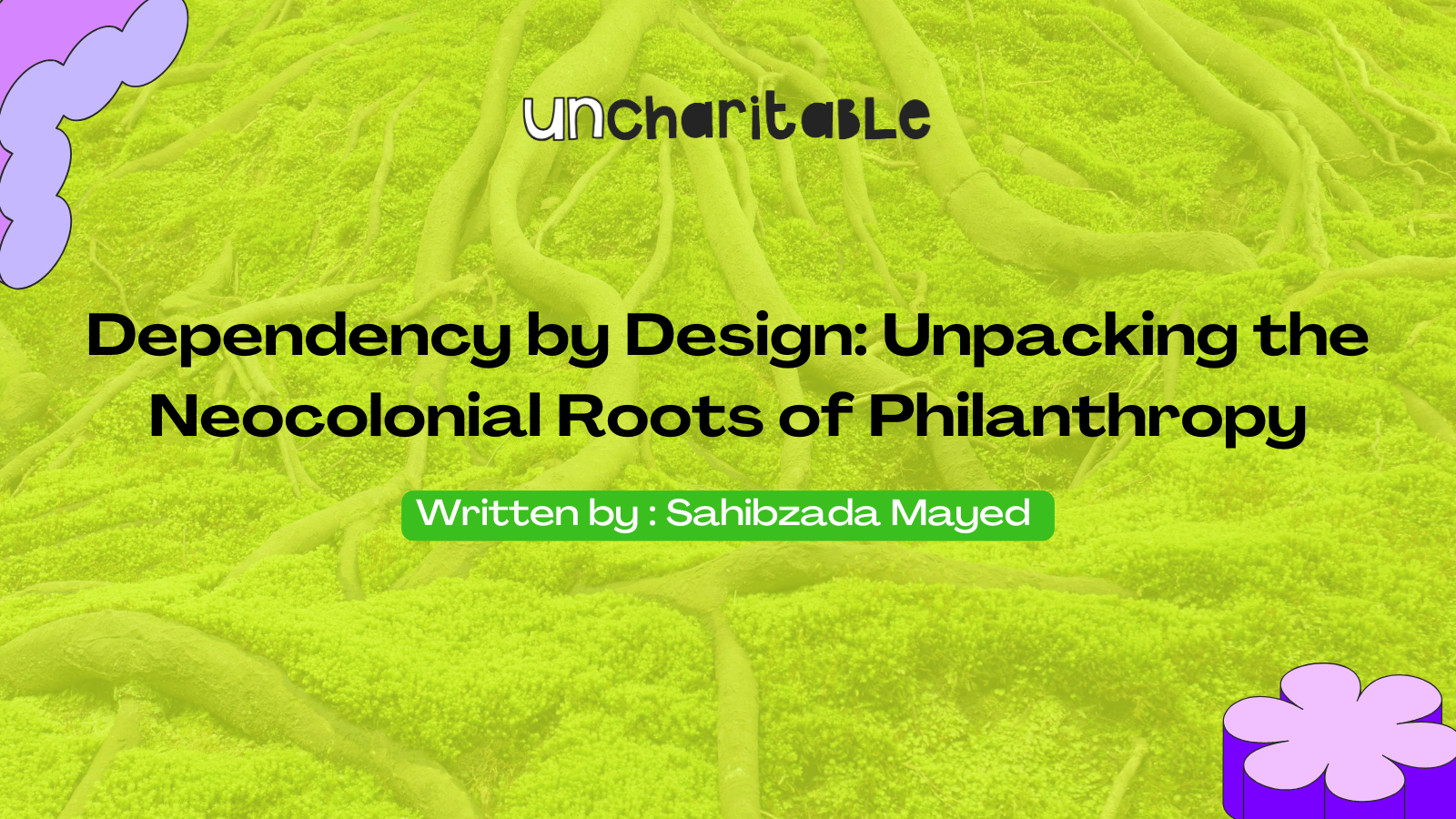Dependency by Design: Unpacking the Neocolonial Roots of Philanthropy by sahibzada mayed
sahibzada mayed is a creative alchemist with an extensive background in community organising, emancipatory research, participatory design, and speculative futures. mayed's work draws upon the rich, emergent lineages of critical design movements that are actively transforming the status quo. Through their work, mayed creates transformative experiences that cultivate shared joy, fuel our collective imagination, and weave visions for liberatory futures. As a serial entrepreneur and multidisciplinary creative, mayed has received significant recognition globally for leading grassroots, intersectional work at the forefront of creative innovation and social impact.
What if the very systems designed to “help” are the ones holding us back? Philanthropy often arrives cloaked in compassion—in the form of aid, grants, programs, and partnerships—with the promise of social progress and transformation. However, behind this veil of benevolence lies an uncomfortable truth: philanthropy routinely serves as a tool of neocolonial power and subjugation, sustaining the cycles of domination and extraction it claims to oppose.
In this Uncharitable paper, I invite us to look deeper and interrogate the power dynamics that lie beneath the seemingly innocent desire for giving, to expose the violence wrapped up in the language of care and illusion of help, and to reclaim the right to determine and shape our own futures.
Manufacturing “Need”: Designed to Disempower
To justify its existence and maintain its dominance, philanthropy often relies on constructing narratives that portray communities as deficient and impoverished. This is not accidental but an essential element of how philanthropy is designed.
The image of the poor, underdeveloped, or at-risk population becomes a canvas upon which philanthropic vultures establish their own demand. Rather than facilitating collective power, these systems reduce people to problems that need to be solved. In the process, individual agency is eroded and communities are robbed of their capacity to define their own conditions for thriving.
This “need” is engineered by seeking to erase the structural conditions of harm and instead locate failure within communities themselves. The image of a suffering subject is essential to maintain the role of a saviour. Empire has always justified its expansion by declaring entire populations uncivilised and incapable of self-governance. Thus, justifying the need for intervention. This same ideology is regurgitated in philanthropic work, lurking behind the illusion of development and humanitarianism.
Under the guise of help, communities are framed as passive recipients of aid, rather than active holders of knowledge and wisdom. This creates fertile conditions for a paternalistic architecture, where those in power are presumed to know what's best for the very communities they marginalise.
Philanthropy as a Weapon of Control
Philanthropy is never apolitical or neutral—it dictates how and where funding is allocated, whose agendas are prioritised and validated, and what forms of resistance are deemed acceptable and tolerated. It effectively serves as a mechanism to discipline, celebrating palatability and punishing any form of radical imagination that threatens the status quo. Essentially what philanthropy does is reward proximity to power, not accountability to community.
To stay relevant, organisations are compelled to adjust their goals and objectives to align with funders’ priorities. Those who refuse to bend or distort their commitments, particularly grassroots movements leading transformative work directly with impacted communities, are often defunded and overlooked. As such, philanthropy functions less as a support system for justice and more as a form of strategic containment—a means of absorbing dissent and suppressing resistance, managing social unrest without ever addressing its root causes.
When Resources Become Leashes
Any form of aid or support comes at a price. What are often framed as checkpoints for accountability—project deliverables, impact metrics, progress reports—effectively serve as tools for extraction and surveillance. So much complexity and depth is lost in trying to appease and become more legible to institutional stakeholders, in trying to convert deeply relational work into digestible, quantifiable outputs for the elite few who remain detached from the realities on the ground and do not understand the struggles they claim to want to address.
There is also a desire to slowly suffocate social movements by drawing them into endless cycles of bureaucracy and seeking to burn out their capacity and momentum. They are often asked to portray themselves as perpetual victims in need of saving, to perform their suffering in ways that evoke empathy but never discomfort, to neatly package their oppression into narratives that are still palatable, and to demonstrate impact through sterile metrics that flatten complexity, erase context, and fail to humanise those who bear the brunt of interlocking systems of oppression.
This is precisely how resources, instead of enabling communal sufficiency and empowerment, become leashes to bind communities with and keep them forever contained.
Beyond the Saviour Complex: Reimagining Relational Responsibility
Philanthropy as we know it is rapidly dissolving, and what we’re witnessing is not just the decay of outdated philanthropic models but the collapse of their legitimacy. As extraction loses its moral cover and saviorism grows transparent, the foundations of this system are fully exposed.
Collapse, in this pivotal moment, does not mean absence; rather, it signals that space is opening, and what fills that space depends on our capacity to imagine and relate differently. Relational responsibility is not about building shinier institutions, but instead, nurturing our collective capacity. Our capacity to navigate discomfort, metabolise grief, hold contradictions, embrace complexity, and move with care.
Capacity is necessary infrastructure, allowing us to shape change beyond moments of crisis and ensure we’re not replicating the systems that never served us to begin with, by merely redecorating their aesthetics.
To break free from the shackles placed on us, we must incrementally and relentlessly dismantle our dependency on systems that exploit our communities and threaten our livelihoods, while simultaneously investing in capacity-building to sustain our movements.
This moment of unravelling offers a profound opportunity: to move from performance to practice, from optics to embodiment.
Moving Toward Repair and Self-Determination
We do not need better philanthropy—we need to end our reliance on it altogether and render it obsolete. This is not about reform, which merely rebrands the problem. This is about composting the logics that tether us to control and scarcity, and nurturing new ways of being rooted in dignity, reciprocity, and trust. We desperately need a radical reorientation of how power, resources, and responsibility are held and realised.
We can only move toward repair when we are ready to reconcile with how wealth is concentrated and resources hoarded, as a result of colonial legacies and systemic injustices. When we are ready to take action beyond funding cycles and annual reports, and are equipped to catalyse progress toward meaningful redistribution. This is not a question of charity but a matter of justice.
Self-determination is not something that can be granted; it must be honoured. It looks like relinquishing authority and control so that communities can shape their own realities. It calls on us to resource movements in ways that do not dilute their work or reinforce existing hierarchies and power differentials. It grows in spaces where people are trusted to lead with their own wisdom, their expertise is valued without having to conform, and they are not required to constantly prove their worthiness.
But self-determination is not the end goal; it is merely the foundation and just one of the necessary building blocks. If we choose to grow possibilities from a place of collective self-determination, we will no longer need philanthropy in its present form. We will have something far more enduring: our mutual capacity to care for one another outside the confines of institutional and state violence.
Arundhati Roy captures the essence of practising the futures we want to see realised. We must pay attention to what seeds are being planted and how we can tend to their growth and regeneration:
“Another world is not only possible, she is on her way. On a quiet day, I can hear her breathing.”
What comes next will not descend from power—it will be rooted in memory, seeded through struggle, and imagined through our refusal to allow our futures to be stolen from us.

